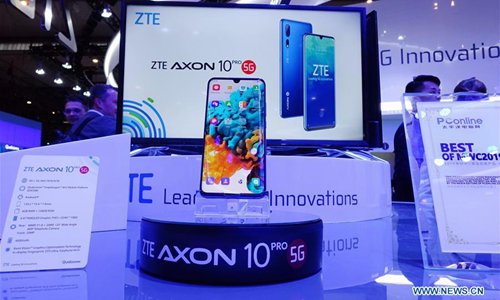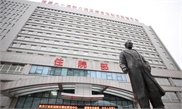
China's ZTE presents its Axon 10 Pro 5G cellphone at Mobile World Congress (MWC 2019) in Barcelona, Spain, Feb. 26, 2019. Photo: Xinhua
A push from some US politicians to block the US federal pension fund from investing in Chinese companies such as ZTE and Hikvision is another attempt by Washington to politicize rational economic cooperation between the two countries.
It is also a gambit on the part of Washington DC to promote the "China Threat" that US politicians often use to cover up internal economic failures during an election year, observers said.
The move will only hurt the interests of US citizens and stakeholders, given that China's capital market has remained basically stable as the virus crisis abates in the country, while many other global markets remain in turmoil.
The comments came after the some US lawmakers and former officials reportedly pressured the Trump administration to halt a $50 billion retirement saving fund, the Thrift Savings Plan (TSP), to track an MSCI index that included stocks of Chinese companies.
Chinese firms included video surveillance-maker Hangzhou Hikvision Digital Technology and telecoms equipment company ZTE Corp, which Washington claims abuse human rights and even threaten US security.
"Just like they passed the buck to China regarding their handling of the pandemic, US politicians are now instigating anti-China sentiment to conceal their own internal economic failures and to win votes as US presidential election approaches," Dong Dengxin, an adviser to the China Securities Regulatory Commission, told the Global Times on Wednesday.
Analysts stressed that politicizing normal economic investment decisions with China is a risky act that goes against economic rules and the trend of global cooperation.
Gao Lingyun, an expert at the Chinese Academy of Social Sciences, said that the cost of politicizing economic affairs will be unbearable for the US economy, which has been staggering under the impact of the deadly virus. And any "irresponsible" decision involving the fund could worsen the livelihoods of US elderly people and reduce Washington's health expenditure.
"It is quite normal that funds opt to invest in China, where returns are higher. Also, as the coronavirus eases in China, it is easy to tell that which country is the one with a more promising market," Gao told the Global Times on Thursday. "How the administrators manage the TSP fund is purely out of political consideration."
Although rapidly rising numbers of confirmed COVID-19 cases have jolted global investors, China's stock market has been somewhat immune to global fluctuations and has thus been deemed a "safe heaven" for investment.
In the first quarter, China's Shanghai Composite Index slumped 9.83 percent while the Nasdaq-style ChiNext board gained 4.1 percent. In a stark contrast, the Dow Jones Industrial Average sank 23.2 percent from January to March, its biggest decline since the fourth quarter of 1987.
"If US funds exit the Chinese market, there would be a much higher cost for them to re-enter. US politicians had better make some calculations before storming out," Dong said.
The Federal Retirement Thrift Investment Board (FRTIB), which administrates the TSP, decided in 2017 to switch its investment portfolio in 2020 to an MSCI index that represents 99 percent of world equities including those from China. Some hardliners in Washington in November sought a legislative ban on investment in China, but were unsuccessful, according to Reuters.
Now, administrators of the fund have begun opening overseas custodial accounts and investments are due in the second half of 2020, per Reuters.
The two Chinese companies involved in the matter had not responded to the Global Times' request for interview by press time.




